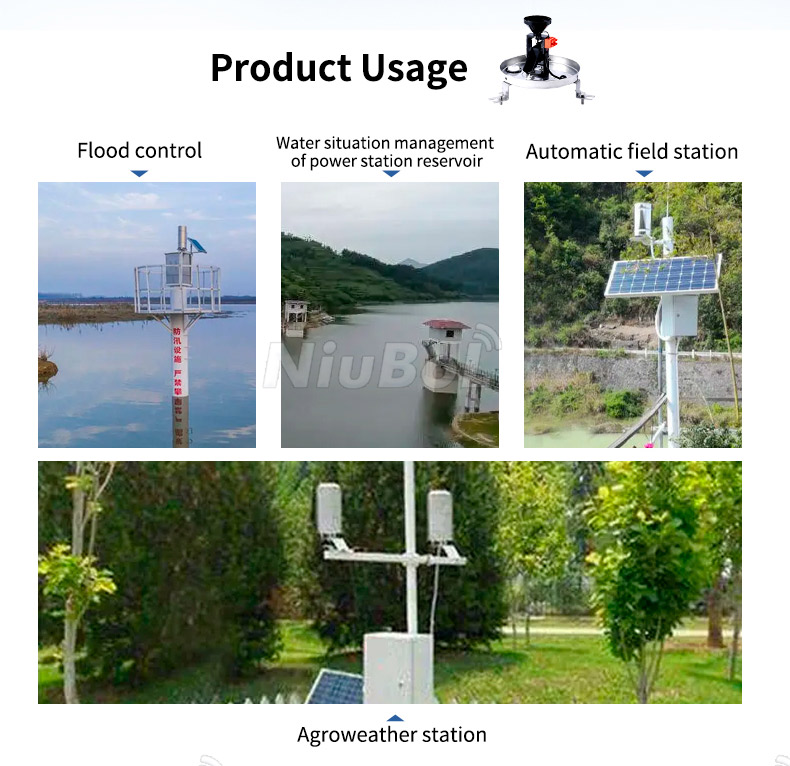

— Products —
 Consumer hotline +8618073152920
Consumer hotline +8618073152920 WhatsApp:+8615367865107
Address:Room 102, District D, Houhu Industrial Park, Yuelu District, Changsha City, Hunan Province, China
All products
The Tipping Bucket Rainfall Sensor is an instrument used to measure precipitation, to measure the amount of natural rainfall, and at the same time, to convert the rainfall into a digital information output in the form of switching, in order to meet the needs of information transmission, processing, recording and display. For example, 0.1mm, 0.2mm, 0.5mm tipping bucket rain gauge, its working principle is to record the amount of precipitation by turning over one or more contai···
Tel/WhatsApp:+8615367865107
Email:Arvin@niubol.com +Nearly 100 partner company in more than 68 countries. We are committed to providing high-quality, practical products to meet your needs and help you solve problems.Product Details









The Tipping Bucket Rainfall Sensor is an instrument used to measure precipitation, to measure the amount of natural rainfall, and at the same time, to convert the rainfall into a digital information output in the form of switching, in order to meet the needs of information transmission, processing, recording and display. For example, 0.1mm, 0.2mm, 0.5mm tipping bucket rain gauge, its working principle is to record the amount of precipitation by turning over one or more containers (usually called "tipping bucket"). Below is a detailed description of this product:
The Tipping Bucket Rainfall Sensor is a popular precipitation monitoring device used in a variety of environments including weather stations, hydrological monitoring stations, agricultural research and urban planning. The device typically consists of a container (tipping bucket) filled with water and a mechanism to record the number of tipping times. As precipitation passes through the opening of the sensor, the tipping bucket is filled with precipitation and eventually tipped, with each flip corresponding to a certain amount of precipitation.
1. Accurate measurement: Precise calculation of precipitation is possible by accurately recording the number of times the tipping bucket is turned over.
2. Automatic recording: Modern Tipping Bucket Rainfall Sensors are usually equipped with an electronic recording system that automatically records data from precipitation events.
3. Durability: These sensors are usually made of corrosion-resistant materials that can withstand harsh weather conditions.
4. Easy to maintain: Tipping bucket rain sensors are simple in structure and require low maintenance.
5. Multi-scale measurement: Different capacities of tipping buckets can be used as required to suit different measurement needs.
6. Data Output: Most of the sensors can output data for instant monitoring and recording.

1. Weather Station Network: The National Weather Service uses Tipping Bucket Rainfall Sensors to monitor precipitation across the country. The data is used for weather forecasting, flood warnings and other meteorological services. For example, when the sensors record a large amount of precipitation, the Met Office may issue a flood warning to inform residents to take precautionary measures.
2. Agricultural irrigation management: Tipping bucket rain sensors are used in vineyards and orchards to monitor precipitation for precise irrigation control. This data helps farmers to conserve water during the dry season and to irrigate appropriately when needed.
3. Hydrological research and flood warning: In the Amazon rainforest, scientists use tipping bucket rain sensors to study precipitation patterns and flood cycles. These data are critical to understanding the impact of climate change on the rainforest.
4. Urban stormwater management: In urban environments, tipping bucket rain sensors are used to monitor inflows to stormwater networks in order to better design and operate rainwater collection and drainage systems. For example, in New York City, these sensors help city planners evaluate the effectiveness of "green infrastructure" projects such as rain gardens and permeable paving.
5. Environmental monitoring and research: In high mountain regions, bucket rainfall sensors are used to monitor the impact of glacial retreat on precipitation patterns. These data are essential for understanding global climate change trends and the availability of local water resources.
6. Forest management and fire prevention: In forested areas, tipping bucket rainfall sensors are used to monitor precipitation to assess drought levels and forest fire risk. This information helps the Forest Service to develop effective forest management strategies and fire prevention measures.
These cases show that tipping bucket rain sensors play a key role in a variety of fields, from weather forecasting and flood warning to water resource management and climate change research. By providing accurate, real-time precipitation data, these devices help a variety of industries make more informed decisions to address weather and environmental challenges.
Sensors & Weather Stations Catalog
Agriculture Sensors and Weather Stations Catalog-NiuBoL.pdf
Weather Stations Catalog-NiuBoL.pdf
Related recommendations
 Multi-Depth Soil Sensor RS485
Multi-Depth Soil Sensor RS485 TDR Soil Moisture Sensor
TDR Soil Moisture Sensor Pyranometer Solar Radiation Sensors
Pyranometer Solar Radiation Sensors Soil ph sensor
Soil ph sensor Tipping Bucket Rain Gauge
Tipping Bucket Rain Gauge Air Temperature and Humidity Sensor
Air Temperature and Humidity Sensor
Screenshot, WhatsApp to identify the QR code
WhatsApp number:+8615367865107
(Click on WhatsApp to copy and add friends)